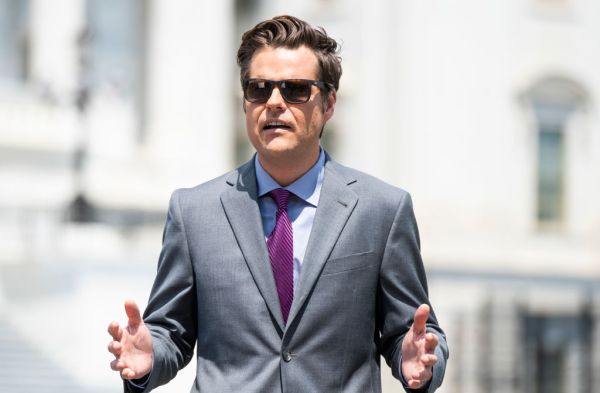In postliberal America, you need to find happiness where you can. Something I’ve been enjoying lately is watching critics declare Matt Gaetz and Pete Hegseth unfit for office because, allegedly, they’re sex pests.
My friends: This country just made Donald Trump president. Again. After he was found liable in a civil trial for sexual abuse.
Gaetz and Hegseth are unfit, certainly, but basing the case against them on their sexual behavior reminds me of Hollywood’s double standard between sex and violence. Americans will happily consume the most luridly gory slasher flicks and shoot-em-ups without batting an eye; get a tiny bit too graphic in depicting coitus, though, and everyone coughs and straightens their ties.
It’s fair and fine to oppose Hegseth and Gaetz because their personal conduct has been dubious enough to have created legal complications for them. But if you’re more outraged by that than by the possibility that they’ll try to turn the military and federal law enforcement into revenge machines for their authoritarian patron, you’ve grown numb to the goriest stuff playing out in front of us. Violence against the constitutional order, not sex, is the primary reason to reject them.
The fact that so many Trump critics have drilled down on these nominees’ sex-pest-ery rather than their postliberal toadyism seems significant to me. The same goes for conservative critics like Mike Pence who base their opposition to Robert F. Kennedy Jr.’s Cabinet nomination primarily on his pro-choice politics. That’s certainly a valid reason for a pro-lifer to dislike Trump’s pick—but it feels trivial under the circumstances relative to the actual reason to oppose him.
Kennedy isn’t unfit because he’s about to usher in abortion on-demand nationally over Trump’s objections. He won’t. He’s unfit because he’s a conspiratorial crank of epic proportions. Lending the authority of the federal government to his ravings will lead millions of trusting Americans to make calamitous health decisions, starting of course with declining to vaccinate their children. I can only assume that critics like Pence are dancing around that argument because they’re convinced the right writ large is too immersed in crankery to care.
Likewise, I can only assume that critics are dancing around the civic argument for opposing Gaetz and Hegseth because they’ve lost all faith that Americans might respond to it. The public’s tolerance for a fascist government was litigated on Election Day; they either don’t believe it’ll happen or, as I suspect, don’t care. Faced with that, Trump’s opponents are forced to fall back on arguments for borking his nominees that are so outdated as to seem quaint. They’re perverts! Kennedy is pro-choice!
Maybe we’d have more luck getting Americans to care if we eased off of the substantive case against Trump’s nominees and pivoted to the procedural case instead.
Namely: Whenever the party in charge abuses its power, it sets a precedent that can and will be used against it the next time the out-party is elected. Every Gaetz, Hegseth, and Kennedy has a counterpart somewhere on the left; lowering the bar for appointments so that the GOP’s misfits can clear it ensures that the Democratic misfits of tomorrow will sail through as well.
That’s especially so if Trump and House Republicans end up colluding in recess-appointment chicanery to let him install the Cabinet he likes without the Senate’s advice and consent. To my knowledge, no president has ever sought to dispense entirely with the upper chamber’s confirmation power, which is what Trump’s scheme would amount to. It would be a meaningful step toward dictatorship if he succeeds, without hyperbole.
And it too would set a precedent than can and will be used eventually by Democrats. Won’t it?
The end of precedent.
Some very smart people have begun pressing the procedural case against recess appointments, including our own Sarah Isgur. “Y’all realize the Democrats will win another presidential election someday, and then under your new theory, they get to appoint whatever lunatics they find without the support of even their own party?” she tweeted on Tuesday.
“And SCOTUS has all but naw-dawg-ed this idea already,” she continued. “[In] 2014 they unanimously shot down [Barack] Obama when he tried to recess-appoint over a three-day intra-session recess. So your plan is to ignore the Supreme Court AND hand your opponents an enormous weapon in a few years all while gutting the constitutional function of the Senate? Cool, cool.”
The Republicans’ purported plan is even nuttier than that, Matt Glassman noted. A former congressional staffer and expert on House procedure, Glassman pointed out that the right has far more to potentially lose by normalizing presidential recess appointments than the left does given that the Senate map is trending red. 2026 will be another cycle in which Democrats face tougher races than Republicans and rising discontent with blue-state dysfunction risks putting even some safe-ish liberal seats in play.
Senate Democrats now have a “practical ceiling” of 52 seats versus 62 for the GOP, a despondent Sen. Chris Murphy of Connecticut estimated earlier this month. That being so, Glassman argued, why on earth would Republicans want to mainstream a procedure by which a Democratic president and Democratic House could collude to force a Republican Senate into recess, allowing that president to fill his or her Cabinet with progressive weirdos?
Every abuse of power is a precedent. Today’s Secretary Pete Hegseth is tomorrow’s Secretary Rachel Maddow.
Nowhere is that better understood than in the United States Senate, where the filibuster endures despite efforts by everyone from Chuck Schumer to Donald Trump to get rid of it. Its survival is due to nothing more complicated than fear of what the other side might do with its next majority once the 60-vote threshold in the chamber is gone—so much so that new Senate Republican leader John Thune was quick to promise last week that his party will protect Democrats’ right to filibuster. Imagine that: In an era of otherwise total Republican subservience to Trump, Thune is more anxious about what the left might pass in a post-filibuster Senate than he is about earning the wrath of the incoming White House.
That’s how it should be in a liberal system. The rules are neutral, the voters are fickle, and there’s always another election right around the corner. Institutionalists like Thune are obliged to worry about the precedents they set because they know the other side might get the opportunity to use those precedents against them much sooner than anyone thinks.
What are we to make of the fact, then, that Donald Trump conspicuously does not seem worried as he goes about setting precedents that the American right would regard—correctly—as nuclear strikes on the constitutional order if a Democrat had set them?
Forced adjournment of Congress, purges of “disloyal” government officials, using the military to enforce the law domestically: All of it is on the table already, two weeks and a day since Trump was reelected. On Tuesday, the Washington Post threw another log on the fire when it reported that Trump has “so far declined to let the Federal Bureau of Investigation check [his Cabinet nominees] for potential red flags and security threats to guard against espionage—instead relying on private campaign lawyers for some appointees and doing no vetting at all for others.” He and his team might end up granting blanket security clearances to nominees like Tulsi Gabbard, per the Post, despite not knowing whether they’re compromised or how.
Why doesn’t Trump care about the horrendous precedents he’s setting for future Democratic presidents by doing all of this?
“He’s an ignoramus,” some might reply. “He’s so narcissistic that he can’t conceive of the consequences of his decisions except in terms of his own self-interest.” And that’s fair enough. It’s surely true that Trump doesn’t care how much his party suffers once he’s done with politics. He probably relishes the prospect, not wanting to imagine that the GOP might thrive without him.
But I suspect none of that explains why he’s unconcerned about precedent. The likely truth is that he isn’t worried about Democrats emulating his abuses of power because he doesn’t believe Democrats will ever again wield power. The other party can’t turn the tables if it never gets a chance to govern.
Asymmetric power.
I’m going to spend the next four years warning people that Trump’s party will resist handing over power if it loses the next presidential election and practically everyone will call me hysterical for saying so, as if it didn’t already happen once before.
But I’m as confident in that prediction as I was in assuming that Americans were going to reward Trump’s previous coup attempt by handing him a second term. Partly it’s a matter of “past is prologue” (or “character is destiny,” if you prefer), partly it’s a reflection of the fact that J.D. Vance—the heir apparent and presumptive 2028 nominee—is an avowed coup enthusiast who’s said, on the record, that he believes America is in “a late republican period.”
Mainly, though, I think I’ll be right because I can see the sort of government Trump is building. I can’t imagine him hollowing out the Justice Department, the Pentagon, and the intelligence community and filling them up with toadies just to ensure that there’s less friction in executing policy until 2029. Building a bureaucracy in his own image is an attempt to convert the executive branch into a kingdom. And kingdoms aren’t cheerfully transferred to enemies in neat little four-year terms.
Nothing is sillier than the idea of President Trump fulfilling his fantasy of making the military and law enforcement loyal to him personally rather than to the Constitution and then graciously ceding their absolute obedience to President-elect Gretchen Whitmer. Ironically, in fact, the sheer ruthlessness of the postliberal precedents he’s setting will eventually be cited as a justification for refusing to hand over power in four years. It’ll be the “Flight 93” logic of 2016 on steroids: Having successfully demolished all constraints on executive power, how could right-wing populists be so reckless as to hand that power to an evil left-winger?
So when Sarah Isgur asks, rhetorically, whether the right realizes that the other party will regain the presidency someday and put Trump’s recess-appointment precedent to use, I think the response from Trumpists is simple: Democrats won’t regain it. Sarah doesn’t “know what time it is.”
And when she wonders whether the plan is to ignore the Supreme Court if it deems Trump’s recess appointments illegal, that answer is simple too: Yes, if it comes to that. That didn’t happen during his first term, I realize, but as you may have noticed from the tenor of last week’s Cabinet nominations, this term will be … different. Defying court rulings is another thing that our new soon-to-be vice president has explicitly condoned, in fact.
That said, I concede that it might not come to that. It will be politically useful for Trump as he goes about implementing his will to maintain a patina of legal legitimacy for his actions, just in case there remains an inkling of civic conscience among Americans that might be inflamed by seeing him go fully rogue. If he tries to force Congress to adjourn in order to justify recess appointments and the courts say no, my guess is that he’ll dial up wary Senate Republicans and start tossing every threat he can think of at them to get them to “voluntarily” agree to a by-the-book recess.
And if they still don’t agree, I suspect he’ll withdraw Matt Gaetz’s nomination, make him White House “justice czar” instead, and get some supplicant confirmed as attorney general whose duties will be to take dictation from Gaetz as he functionally runs the Justice Department instead. There’s only so much the Constitution can do to restrain a president who’s determined to avoid its restraints and who has the support of half the population in doing so. Frankly, “grossly repugnant to the spirit of the law yet technically within the letter” is probably how most of his term will play out.
But if I’m wrong about the next coup and Republicans do make way for victorious Democrats in 2028, Trump and his party still have less to fear by setting dubious executive precedents right now than Democrats would in their place. That’s because, in the near term, America’s political zeitgeist appears to favor the right. Trump made gains on Election Day in nearly every demographic, triggering left-wing panic about being out of touch with the working class culturally and economically. The Supreme Court will have a right-wing majority for a generation that may or may not be more suspicious of left-wing power grabs by ideological nature. And radicals aren’t in charge of the Democratic Party, as they are in the GOP. You needn’t worry about President Josh Shapiro being captured by the socialist equivalent of MAGA cranks once he’s in office.
All of that being so, Trump and his toadies can let their freak flag fly in using executive power to serve the far right without needing to worry much about setting precedents that a liberal successor will exploit to serve the far left. The next Democratic president—if there is one—will run toward the center to win. There will be no Secretary Rachel Maddow in 2029 even if there’s a Secretary Pete Hegseth in 2025.
And if Democrats do moderate in pursuit of power, steering toward the center to shed their “woke” baggage, presumably that moderation will lead them to resist the sort of postliberalism that’s turned the American right into a moral disaster. That too is an asymmetry that encourages Trump and his inner circle, I suspect: They can pursue dictatorship without worrying about the precedents they’ll set by doing so because, when push comes to shove, they don’t believe President Whitmer or President Shapiro would be comfortable emulating them.
The spirit of cynicism.
There’s one more reason Trump and his allies aren’t worried about creating pernicious precedents, I think. Even if Democrats regain power and do take advantage of some of those precedents, the right prefers to fight its political battles on postliberal terrain. They’ll accept having the tables turned on them occasionally as the price of vanquishing America’s liberal norms.
On Wednesday, New York Times columnist Bret Stephens described Trump’s interest in nominating unqualified people to his Cabinet as part of his endless campaign “to perpetuate the spirit of cynicism, which is the core of Trumpism. If truth has no currency, you cannot use it. If power is the only coin of the realm, you’d better be on the side of it. If the government is run by cads and lackeys, you’ll need to make your peace with them.” I think that’s right: If and when Democrats end up capitulating to “the spirit of cynicism” by embracing the precedents Trump is setting, the postliberal Republican Party may end up losing some battles going forward but it’ll have won the ideological war.
An American right that despises classical liberals like Paul Ryan far more intensely than it does progressives like Bernie Sanders might even prefer an authoritarian left-wing government on balance to a traditional right-wing one. You don’t need to believe in “horseshoe theory” to see that. Look no further than Kennedy and Gabbard, both of whom started off in politics as oddball leftists with a taste for illiberalism before finding community with the illiberal oddballs of the populist GOP.
President Tulsi or President Mitt Romney: Is there any doubt which one the party of Trump would prefer to be governed by?
Consider the horrible precedents Trump is setting in office less as a dare to the left, then, and more as an invitation. The sort of Democratic president who’s most likely to try to forcibly adjourn Congress for the sake of recess-appointing an evil moron to their Cabinet is also the sort of Democratic president whom many MAGA types could plausibly take a shine to. And of course, that sort of Democrat is likely to set some novel, sinister precedents of their own in office that the next fascist Republican president can exploit to their advantage.
“Politics is the art of the possible,” Otto von Bismarck said. Donald Trump believes that a lot more is possible under our constitutional system than most of us imagined. As new precedents are set and Americans on both sides grow comfortable with those possibilities, there’ll be no going back.







Please note that we at The Dispatch hold ourselves, our work, and our commenters to a higher standard than other places on the internet. We welcome comments that foster genuine debate or discussion—including comments critical of us or our work—but responses that include ad hominem attacks on fellow Dispatch members or are intended to stoke fear and anger may be moderated.
With your membership, you only have the ability to comment on The Morning Dispatch articles. Consider upgrading to join the conversation everywhere.